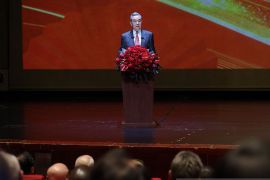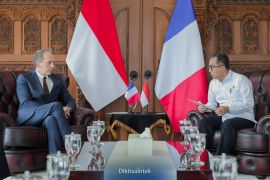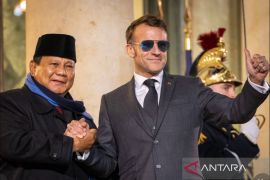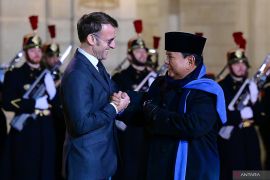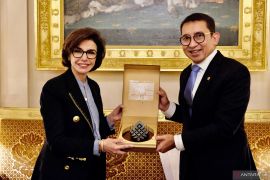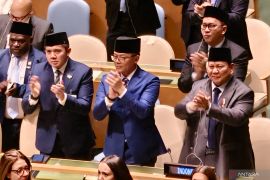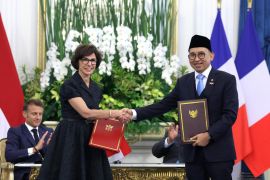In Kuwait city, for instance, Reuters reported that Kuwaiti supermarkets emptied their shelves of French products on October 25, 2020 in support of a call for boycotting French products.
In Indonesia, there were no calls for boycotting French products as of Monday, but Macron’s remarks on Islam and Prophet Muhammad (peace be upon him) invited condemnation from the Indonesian Ulema Council (MUI) and Muhammadiyah.
MUI deputy general chairman KH Muhyiddin Junaidi denounced President Macron’s “move to fuel anti-Islamic sentiment” in France, saying that he was breeding “Islamophobia” among his people by indirectly supporting the “ongoing blasphemy” against Prophet Muhammad.
Junaidi noted that world history shows France was among the Western colonizers with a racist and cruel approach towards the people of its colonies, especially Muslim-populated nations in the African continent.
"Hence, there is no doubt if Macron's Islamophobic behavior draws fierce reactions from the Islamic World, and he is then compelled to withdraw his Islamophobic statements," he told Indonesian journalists in Jakarta on Monday.
He said he has appealed to Foreign Minister Retno Marsudi to summon the French Ambassador to Indonesia and Timor Leste, Olivier Chambard, over Macron’s remarks.
"Macron's Islamophobic statements have triggered so many acts of violence in the world," Junaidi noted while commenting on Macron's support for displaying and reprinting of cartoons on Prophet Muhammad.
Junaidi said President Macron's statements projecting Islam and Muslims worldwide in a negative light by accusing Islam of being “a religion in crisis” have also stoked “Islamophobic sentiments” in France.
Several Muslim leaders, including Turkish President Recep Tayyip Erdogan and Pakistani President Imran Khan, have sharply criticized the controversial statements made by the French president, he pointed out.
In response to Macron's controversial comments, several Muslim-populated nations in the Middle East have launched campaigns to boycott French products, he stated, adding that the Muslim population in France has, in fact, increased steadily and cannot be ignored.
"Some eight million Muslims in France play an important role in the country's development. Muslim soccer players on the French national soccer team, for instance, have significantly contributed to the French nation and state," he remarked.
According to Junaidi, Macron should edify himself on religious tolerance, and especially on Islam. Unfettered freedom that tends to oppose norms will only wreak havoc and create chaos, he warned.
Muhammadiyah, Indonesia's second largest Islamic organization after the Nahdlatul Ulama, has deemed Macron's “anti-Islam” remarks and argument for freedom of expression as “absolutely unacceptable”.
"We regret and are so disappointed with the blasphemous statements made by a leader who has shown intolerance with other people's faith," chairman of Muhammadiyah's central executive board, Dadang Kahmad, said.
President Macron's “blasphemous” and “anti-Islam" statements have confirmed his intolerance for other people who do respect their prophets or religious leaders, Kahmad said.
All individuals in pluralistic societies must respect one another and the sacredness of faiths or religious beliefs despite their ethnic, racial, socio-cultural, and religious differences, he added.
"We respect the feelings of all religious adherents by not mocking and insulting holy figures of any religion," he said.
Another top Muhammadiyah figure, Anwar Abbas, also denounced Macron saying that he was a typical leader who could create religious hatred and hostility among different adherents in the world, if he failed to change his way of communication.
The French president could also drag international communities into havoc, deep hostility, and endless revenge, he said adding, it is advisable that Macron apologize for what he has done.
Macron’s remarks following the beheading of Samuel Paty, a history and geography teacher, for showing cartoons of Prophet Muhammad during a class have sparked controversy over their “Islamophobic” content.
Eighteen-year-old Abdullakh Anzorov, who killed Paty on October 16, 2020, was later shot dead by the French police. Anzorov had felt offended by Paty’s “blasphemous” act.
Responding to Paty’s death, Macron was quoted by the BBC as saying: “France will not give up our cartoons.”
Following his death, Paty was bestowed the Légion d'honneur, France's highest honor.
In the aftermath of his murder, cartoons depicting Prophet Muhammad, made by Charlie Hebdo, were projected onto public buildings.
Prior to this case, the French satirical weekly magazine has frequently published cartoons that have triggered public ire in several Muslim-populated countries.
Two persons had attacked the offices of the magazine on January 7, 2015 after it published cartoons on Prophet Muhammad, justifying their publication was in accordance with the freedom of speech and expression. The attack had left 12 people dead and 11 injured. (INE)
In the midst of the coronavirus pandemic that has paralyzed public health and economy in so many countries, including France, President Macron has created unnecessary problems that may pose a threat to world peace and stability, according to observers.
Macron has exercised his absolute freedom to critique Islam and Muslims all over the world, they said adding, he, then, must also accept if French products are boycotted as part of Muslim response to his statements. (INE)
Related news: Muhammadiyah denounces French president's 'anti-Islam' remarks
Related news: MUI urges Marsudi to summon French ambassador over Macron's statements
EDITED BY INE
Editor: Fardah Assegaf
Copyright © ANTARA 2020

